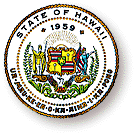
Gov urged to
release ‘ice’ funds
Providers distribute a flier claiming the delay
is causing waiting lists for treatment to grow
Substance abuse treatment providers are circulating fliers asking people to urge Gov. Linda Lingle to release more than $14 million that the state Legislature approved to combat the "ice" epidemic.
The providers are trying to arrange a meeting with Lingle but want public support "because we wanted it to be more community-based. It's not just about us; it's a bigger problem," said Claire Woods, Hawaii Substance Abuse Coalition chairman.
 Woods said the providers are getting impatient after a year of rallying community support to fight crystal methamphetamine use.
Woods said the providers are getting impatient after a year of rallying community support to fight crystal methamphetamine use.
"That's a dangerous thing to do, get people's hope up, and nothing's happened," she said.
The $14 million was included in House Bill 2004, CD1, the Legislature's omnibus ice appropriation bill, which took effect July 1 without Lingle's signature. So far, Lingle has not released any of the money.
"The items in Act 40 (the bill) are all going through the budget review process to assure that each of the programs will produce measurable results," said Russell Pang, Lingle's press secretary.
Lingle is in New York to attend the Republican National Convention and is scheduled to return Friday.
Funding for ice treatment and education reform were priority appropriation measures for the Legislature, said House Vice Speaker Rep. Sylvia Luke (D, Dowsett Highlands-Makiki).
"The funding request was the result of public input during 80 hours of hearings. We are happy the community is coming forward, and we continue to urge the administration to release the funds," Luke said.
The flier claims the lack of funding is causing waiting lists to grow, forcing treatment programs to close and diverting more ice abuse cases to hospital emergency rooms.
The number of people waiting to get into residential substance abuse treatment programs fluctuates between 150 and 200 from day to day, said Elaine Wilson, chief of the state Department of Health Alcohol and Drug Abuse Division.
"They (providers) could immediately fill 80 beds, I know, if they had the money," she said.
Hina Mauka Chief Executive Andy Anderson said his program has six to eight open beds a day.
"There's beds available but no money for them," he said.
Wilson said she is not aware of any programs waiting for funding that were forced to shut down. But she said there are some that are running out of money.
She said the administration is focusing on releasing money for the Big Island Substance Abuse Center to continue operating an adult residential treatment facility in North Kohala and provide substance counselors for students at four Big Island high schools.
www.state.hi.us/health